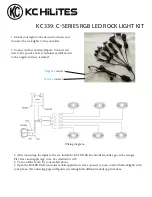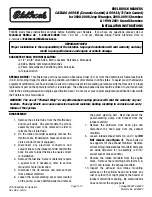
If a Tire Goes Flat
It’s unusual for a tire to “blowout” while you’re driving,
especially if you maintain your tires properly. If air goes
out of a tire, it’s much more likely to leak out slowly.
But if you should ever have a “blowout,” here are a few
tips about what to expect and what to do:
If a front tire fails, the flat tire will create a drag that
pulls the vehicle toward that side. Take your foot off the
accelerator pedal and grip the steering wheel firmly.
Steer to maintain lane position, and then gently brake to
a stop well out of the traffic lane.
A rear blowout, particularly on a curve, acts much like a
skid and may require the same correction you’d use
in a skid. In any rear blowout, remove your foot from the
accelerator pedal. Get the vehicle under control by
steering the way you want the vehicle to go. It may be
very bumpy and noisy, but you can still steer. Gently
brake to a stop, well off the road if possible.
{
CAUTION:
Lifting a vehicle and getting under it to do
maintenance or repairs is dangerous without
the appropriate safety equipment and training.
The jack provided with your vehicle is
designed only for changing a flat tire. If it is
used for anything else, you or others could be
badly injured or killed if the vehicle slips off
the jack. Use the jack provided with your
vehicle only for changing a flat tire.
If a tire goes flat, the next part shows how to use your
jacking equipment to change a flat tire safely.
5-69
carownersmanual.net
carownersmanual.net
Summary of Contents for 2004 L-Series
Page 6: ...NOTES vi carownersmanual net carownersmanual net...
Page 80: ...NOTES 1 74 carownersmanual net carownersmanual net...
Page 126: ...NOTES 2 46 carownersmanual net carownersmanual net...
Page 128: ...Instrument Panel Overview 3 2 carownersmanual net carownersmanual net...
Page 200: ...NOTES 3 74 carownersmanual net carownersmanual net...
Page 372: ...NOTES 7 12 carownersmanual net carownersmanual net...
















































